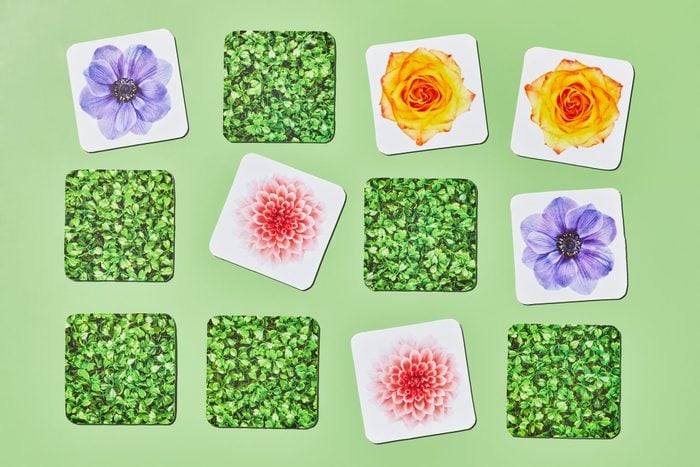9 Science-Backed Tricks to Improve Your Memory: Never Forget Your Keys Again!
Updated: Mar. 11, 2024

Feeling forgetful? We asked brain-health experts for memory tricks that'll teach you how to remember things better.
Memory can be a curious thing. Why can you so easily recall the name of the kid you sat next to in first grade but can’t remember where you left your cell phone five minutes ago? If you’re desperate for advice on how to remember things better and worrying that your memory slips may indicate a serious issue, don’t stress—there’s probably nothing wrong with your brain. The odds are much better that you’re just distracted.
“The mind has a tendency to wander,” says Jennifer Heisz, PhD, associate professor of brain health and aging in the Department of Kinesiology at McMaster University in Hamilton, Ontario. “Mind-wandering is a form of distraction that can interfere with one’s ability to learn and remember new information.”
We all want to know how to be smart, right? So if you’d like to know how to remember names better or want to learn something new every day, you’ll be happy to discover that these goals are perfectly attainable.
Get Reader’s Digest’s Read Up newsletter for more brain-boosting tips, humor, cleaning, travel, tech and fun facts all week long.
Why do we forget things?
A lot of our minor memory blips can be chalked up to having too many plates spinning at the same time. “Human attention is a limited resource,” says Heisz. “This means that we are unable to process all the information in the environment. We have to select only part of it.”
And by selecting only certain info to retain, our brains let the rest of our daily data seep through them like a sieve. So if you’re on the phone while making dinner and fielding questions from the kids, your busy mind might not hold on to every last word of the phone conversation.
The stage of life you’re in can be a factor too. “As we get into midlife, we have more responsibilities: aging parents, children and more responsibilities at work,” says Jason Krellman, PhD, an associate professor of neuropsychology at Columbia University Irving Medical Center in New York City. All of those obligations can make our memory battery run down faster.
So the upshot here is this: If you learn how to focus better, some of these minor memory slips may start to vanish.
How to remember things
We talked to experts and dug into the science to find tips and tricks—both to use in the moment and to build a sharper brain for life—that can help give you the memory of an elephant.
1. Use a mnemonic device
Never heard of mnemonic devices before? It’s a memory strategy where we code new information in a way that will help us remember it later.
“Let’s say you have a grocery list of apples, strawberries and milk,” says Krellman. “You can encode that information by picturing the items. That image will be stored in a different area of the brain, and you retain that over time.”
Other people may prefer to make an acronym out of the items: ASM, for the apples, strawberries and milk on your list. Chances are, you’ve already used mnemonic devices, even if you never knew the term. Roy G. Biv sounds like a man’s name, but it’s a device that helps us remember the colors of the rainbow: red, orange, yellow, green, blue, indigo and violet.
“Mnemonics are helpful to make large pieces of information smaller and more manageable to remember later,” Krellman says.
2. Write it by hand

If you’re struggling to remember information you typed onto your computer or tapped out on your smartphone, there may be a reason: Our brains better encode information when we’ve written it by hand. Among the easiest memory-improvement techniques to try is making handwritten lists instead of digital ones.
A 2021 study published in Frontiers in Human Neuroscience backs this up. Researchers compared participants’ ability to remember vocabulary terms they’d learned by hand-writing with pen and ink, hand-writing with a digital tablet and pen, or typing on a keyboard. They concluded that the movements involved in hand-writing helped participants better memorize new words.
3. Have a home for everything
If your biggest memory sin is not ever being able to find anything, there’s a simple solution to help you with that: “Everything should have a place, and everything should be in its place,” says Krellman.
So always keep the remote control, say, on the table next to the couch. And to avoid that gutted, end-of-the-world feeling of not knowing where your cell phone may be, make a special point of always taking it back to its charger whenever you put it down. Make sure to have a regular spot for other oft-misplaced items, like your wallet and car keys, too. If you’re not sure where an item should live, think about the spot you’re likely to check first and go with your gut.
“Keeping track of things is about awareness and staying focused to our best ability,” he says.
4. Manage your anxiety
There’s been a lot to think and worry about in recent years, and circling, anxious thoughts that stick with us can have a major impact on how to remember things. “Anxiety is a very memory-intensive program,” says Krellman. “If that program is running in the background all the time, your processor will be very, very low.”
He says that anxiety is also a very powerful emotion that doesn’t get resolved quickly, and it makes it very difficult to concentrate. “Anxiety hijacks your thoughts,” he says. Learning how to meditate properly may help keep your mind more still and better able to remember things.
5. Try a new hobby

Krellman says that hobbies with repetitive tasks—like gardening, pottery or knitting—can help improve our mental discipline and boost our memories. “Activities that are motoric can help free up some of your mental resources,” he says.
And there’s science behind his take-up-a-new-hobby advice. One study from the International Journal of Environmental Research and Public Health found that older adults who garden had significantly higher levels of brain nerve growth factors after they puttered in their gardens, a big assist in improving cognition and memory. Is gardening not your thing? Here’s some great advice on how to find a hobby that you’ll want to stick with.
6. Volunteer to help others
It may not help you stop forgetting why you walked into a room right away, but doing good for others doesn’t just make you feel good. One of the many benefits of volunteering is that it can also give you a long-term boost in cognitive functioning. A 2021 study from New Zealand found that volunteering at least monthly was associated with better working memory—as well as more social and cognitive activity.
And if you’re wondering how to boost memory while also making yourself happier, look no further than your nearest nonprofit. Volunteering there or with another organization that helps those in need can give your brain a burst of feel-good hormones that give you a sense of well-being.
7. Play word games and puzzles
If you want to learn how to remember things better, it’s time to pick up a pencil and eraser—or a puzzle app on your phone, if you prefer the digital crossword options. According to Harvard University, memory and thinking skills may improve when you work the daily crossword. One study found that crossword puzzles can improve thinking and memory almost as much as a prescription memory-enhancing medication.
If crosswords aren’t your thing, riddles might help you sharpen your brain too. Whether you try to solve short riddles or long ones, hard riddles or easy ones, keeping your mind engaged is a memory-boosting tip that pretty much all brain scientists want you to get behind.
8. Go for a walk

Physical activity of any kind increases blood flow to the whole body, including the brain. By getting at least 150 minutes of exercise a week, you can keep your brain healthy—and your memory sharp as a tack—for decades to come, says the Mayo Clinic.
But there’s another reason walking is good for memory retention. Remember the old adage that you can clear your mind with a walk? These old sayings stick around for good reason. Experts say that going outside for some fresh air can help diffuse anxiety and keep you more focused—an easy twofer for improving your memory.
9. Pay attention
It may seem like a no-brainer, but paying closer attention to information will make you more likely to retain it. As Heisz notes, distraction is the main reason we struggle to remember things. By concentrating, we give our brains a better chance of holding on to the information we’re taking in.
As a 2018 study by National Institutes of Health researchers found, attention boosts memory by suppressing neuronal activity in a specific area of the brain just before we learn something we want to remember later. The process makes it easier for the information to be encoded into memory.
If you’re struggling with how to remember things better in your day-to-day life, know that juggling too many things may be your biggest enemy. Try monotasking and give each task the focus it deserves. You may be surprised at the memory boost you get in return.
About the experts
- Jennifer Heisz, PhD, is an expert in brain health and an associate professor of brain health and aging in the Department of Kinesiology at McMaster University in Hamilton, Ontario. She is also the author of Move the Body, Heal the Mind.
- Jason Krellman, PhD, is board-certified in clinical neuropsychology and is an associate professor of neuropsychology at Columbia University Irving Medical Center in New York City.
Sources:
- Frontiers in Human Neuroscience: “Advantage of Handwriting Over Typing on Learning Words: Evidence from an N400 Event-Related Potential Index”
- Aging, Neuropsychology, and Cognition: “Volunteering in older adulthood is associated with activity engagement and cognitive functioning”
- Harvard Health: “Have you done your crossword puzzle today?”
- International Journal of Environmental Research and Public Health: “Benefits of Gardening Activities for Cognitive Function According to Measurement of Brain Nerve Growth Factor Levels”
- Mayo Clinic: “Memory loss: 7 tips to improve your memory”
- Nature Neuroscience: “Attention improves memory by suppressing spiking-neuron activity in the human anterior temporal lobe”



